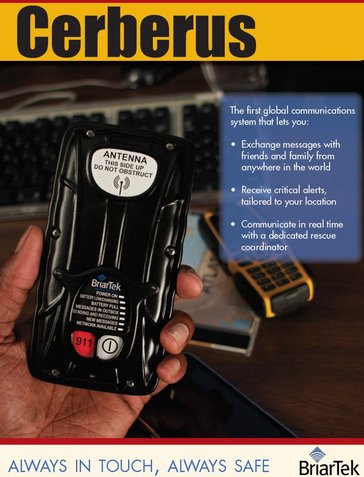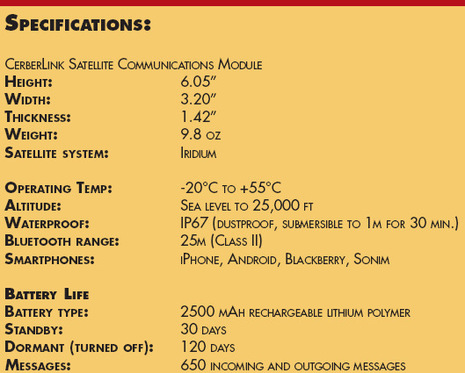And hello Cerberus! Spot Connect on steroids?

Yes indeed, if you're already wowed about how Globalstar's new SPOT Connect might help you communicate when you wander beyond cellular, you'll likely mumble multiple wows once you understand the abilities of the somewhat similar Iridium-powered Cerberus system. Click on that brochure cover above -- seen first right here! -- and behold the Iridium/GPS/Bluetooth communicator itself, with an apps phone in the background, and the three major features called out. And you might make that a triple wow as developer BriarTek intends this to be the three-headed guard dog of satellite messaging...
In mythology, you see, Cerberus is the triple headed hound who guards the gates of Hell. I was a little taken aback when I googled this prior to speaking with BriarTek's Joe Landa a few weeks ago, but he explained that their customers often do "go to Hell and back." While you may recall his company from a Panbo entry about its ORCAdsc MOB alarm, poking around the BriarTek site suggests that its history is largely about providing safety gear to the military. Cerberus is definitely designed for military and commercial users, but Landa made it clear that BriarTek foresees a lot of other users -- like, in the words of his brochure, "All serious boaters. All dedicated hikers. All travelers to exotic locations."At any rate, Cerberus does have three components, as suggested by the overall system name, and laid out in the slide below. Cerberlink is what they're calling the hardware part, which contains the much anticipated Iridium 9602 SBD modem along with GPS, memory for saving received messages, and lots of battery capacity (more detail way below). Like Spot Connect, the messenger has a dedicated distress button, though most functions are controlled by an apps phone or tablet. I haven't seen screens of what BriarTek is calling Cerbertouch -- which will be available for the usual Android, Apple, and Blackberry subjects, as well as the unusual Sonim ruggedized phones -- but I suspect it will be much like the Connect app seen in the last entry. Except, of course, that Cerberlink and Cerbertouch can receive messages as well as send them, anywhere, which are HUGE...
Now two way rescue messaging is a brand new thing, and we no doubt have a lot to learn about it, but my sense is that one day we'll look back on one-way systems like EPIRBs, PLBs, and SPOT as kind of crude...the cause of too many unnecessary SAR operations, and too much anxiety about whether a rescue was in the works. I'm not saying that Cerberus will replace EPIRBs rapidly -- for one thing, the Cerberlink is not really designed to work in the water -- but it's surely a lot closer than SPOT, and will be very tempting because of its other features.
So I don't think BriarTek is exaggerating when they conceive of Cerberus as the three-headed guard hound of satellite messaging. Do you? And fortunately you don't have to rely on this entry to understand the system. Cerberus won't be officially launched for a few weeks, but I just discovered that BriarTek recently put up an informative video about it. You can learn, for instance, that there is a fixed Cerberlink in development that can handle sensor inputs, kind of like Spot Hug, but two-way and truly global. Pricing is not firmed up yet, and rentals will be offered first, but Cerberus will be more expensive than Connect, understandably I think, though I got the impression that it won't be silly high. Besides, one of the good things about the Iridium model is that dozens of developers are working on 9602 SBD products and so we may well see other Cerberus-like offerings soon. There's also an argument that the new Inmarsat iSatphone Pro can do a lot of what Cerberus does, especially with a dock. It may get confusing, but it's all good, I think.



 Share
Share
Hi Ben,
I always thought Iridium's SBD service would only support the transmission of short data packets (about 2kbyte each). But did you have a look to PredictWind's Satellite Communicator?
http://www.predictwind.com/satellite-communicator/
They intend to transmit weather data like GRIB files, which are usually much larger than 2kB. They also offer email services using Iridium's SBD. It all sounds too good :-)
Cheers,
Chriggel